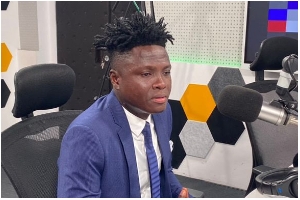Opinions of Sunday, 8 June 2014
Columnist: Pacas, Idris
NAGRAT or Nagrat?: The role of capital letters
Both academics and common sense strictly dictate when to use a small or a capital letter. To begin, we start from capitonyms, used loosely in this write-up to mean any pairs of words which differ from each other because of capitalization (eg, Net referring to Internet and net as used for fishing). Capitalization has two related meanings—to capitalize a letter is to write it in uppercase (b is capitalized as B), but to capitalize a word is to write only the initial letter in uppercase (eg, moon is capitalized as Moon). To lowercase means the reverse.
The question is ‘Where and how do capitonyms differ?’ In terms of where, capitonyms differ only when they occur anywhere in the word group especially in sentences except at the beginning. Thus, these capitonyms, Turkey (country) and turkey (poultry: Meleagris gallopavo) will be written the same if both occur at the beginning of sentences (Turkey is an Islamic nation. & Turkey is often eaten during Christmas).
In terms of how, capitonyms differ in two ways—in meaning and at times in pronunciation. All capitonyms differ in meaning [eg, He’s an Ewe (an ethnic group) & I have a ewe /you/ (female sheep)]. Most capitonyms differ in pronunciation [eg, August (the 8th month) and august /or-gast/ (adjective)]. One of the known persons typically fond of mispronouncing the adjective ‘august’ as if it were homophonous with the noun is President John Dramani. Some capitonyms are pronounced in the same way [eg, No mercury (element) is found on Mercury (the planet)].
To digress a bit, I draw readers’ attention to how important pronunciation is to us (teachers). Our students write oral English test at WASSCE in which they must listen /lisn/ to words from a tape recorder and then answer questions. Thus, even for those words which the dictionary offers two or more correct pronunciations, no normal persons pronounce both or all at each time s/he is speaking. In other words, only one of the pronunciations is considered standard per a location or a profession. And this accepted pronunciation is usually the first one given in most dictionaries. We are neither English persons nor Americans, but we need to always try to pronounce words in ‘understandable’ forms. Hold your different views if you are not in my profession and keep on pronouncing every word the way you want.
To return, we look at the importance of capitonyms. (Being a science teacher, I will take many of my examples from the sciences.) First, we note that capitonyms help us to see the difference between words and then pronounce them correctly (eg, the taxonomic order ‘Primates’ is /praimeitiis/ while ‘primates’, referring to members of this order is /praimeits/).
Second, capitonyms assist us to differentiate proper nouns from either common nouns or other parts of speech. This use is exploited in business where companies convert everyday words into trademarks. A classic example is Sellotape (a device used for mending torn books) and sellotape (verb). Here, you risk being prosecuted for violating copyright laws if you begin the name of the company with a small letter. Notice the controversy between Xerox and Oxford English Dictionary (OED). The company Xerox named its brand of photocopiers as Xerox and has copyrights over the name. OED decided to use it as a verb; this use necessitates lowercasing it as ‘xerox’. The company protested vehemently /vii’imently/ against that use because it (Xerox) will lose its copyrights if the word enters mainstream English as verb. Nonetheless, OED maintains the use a verb.
Other proper nouns distinguished from common nouns or other word classes by capitalization include Mark (human name) and mark (both noun and verb) & Arctic (northern polar region) and arctic (an adjective). Here, lowercasing the capitalized words violates common sense or even amounts to an insult (eg, I saw mark). In teaching, lowercasing the capitalized words attracts a wrong mark. Examples: 1. The mammalian order comprising humans is called Primates. 2. All fungi belong to the kingdom Fungi. 3. The natural satellite of the Earth is called Moon.
In the examples above; the lowercased words ‘primates’, ‘fungi’ and ‘moon’ respectively are all absolutely wrong. The English or common name ‘primates’ refers to the members of the order Primates. All the scientific names above species in the hierarchy of biological classification are treated as proper nouns; thus, fungi are the organisms in the kingdom Fungi just as plants are in the kingdom Plantae. Also, all the 8 planets have moons (eg, Neptune has 14 moons which include Triton, Nereid and Naiad. Notice that the name of each of the moons is capitalized). The term moon refers to any natural satellite. The specific natural satellite of the Earth is called Moon. (This difference is stated unambiguously in the dictionary. Here, the definite article ‘the’ may precede the name if you have so much time and energy to spare for that).
What have we learnt thus far?—That a capital letter must be used at a specified location. An important reminder is that subject names are common nouns (eg, mathematics, economics and biology); the exception being those derived from proper nouns (eg, languages such as French, Twi and Waale) and those marked with numbers (eg, Economics 101 and Biology II). Notice that teachers always capitalize all subject names on the chalkboard or on the whiteboard because the names are written as titles.
Next, we look at another important way in which capital letters are used—uppercasing or ALL CAPS (eg, CPP and WHO). The question is ‘When do we uppercase words?’ Academically, we uppercase only initialisms (technically referring to a string of letters in which each represents a word, eg, NPP, DNA, RNA, ATP and AFAG). The capital letters tell us two important things. First, that each of the letters stands for a word and this implies that internal full stops become irrelevant (eg, PTO and never again as P.T.O.). Second, that these abbreviations are pronounced by the individual letters (eg, WHO /w-h-o/ and therefore different from the pronoun ‘Who or who’ / huu/).
From science, we have this: An LED is an active electronic component. Here, the reader notices that the uppercased form LED /l-e-d/, meaning light-emitting diode, is different from the verb ‘Led or led'. And from ICT, we have this: We are in the IT age. Here, IT /i-t/ is different from the pronoun ‘It or it’. Thus, capital letters are used as pronunciation markers (eg, GES). Never make a mistake in pronouncing an initialism by the words which the letters stand for (eg, GUI is only pronounced as /g-u-i/ and never as /graphical user interface/). For this reason, initialisms are sometimes used as adjectives in which the last word seems redundant but grammatically acceptable (eg, ATM machine and HIV virus).
Looking at the other abbreviations, we consider acronyms. The Concise Oxford Dictionary of Current English (1991) considers acronyms as words derived from the initial letters of other words and are ‘always’ pronounced as words (eg, ‘scuba’/skuuba/ derived from self-contained underwater breathing apparatus’). Like any other nouns, acronyms too could be proper or common. Logically, acronyms that are common nouns, such as the example above, are lowercased (another example is ‘radar’/reida/ from radio detection and ranging).
Acronyms that are proper nouns are either capitalized (eg, ‘Nato’ from North Atlantic Treaty Organization) or uppercased (eg, PIN). Here, a reason, justifiable in academic sense, must exist to explain why some acronyms are written in all caps as if they were initialisms. And here you are! British English (BrE) tends to capitalize acronyms which have no ‘counterpart’ common nouns (eg, ‘Nato’/neito/, ‘Unicef’ and ‘Ecowas’) whilst AmE maintains them in uppercase. Logic supports the BrE usage because capital letters are intimidating to look at, writing them involves extra energy, they occupy more space and finally netiquette tells us that typing in capital letters amounts to shouting.
For clarity sake, however, BrE uppercases only those acronyms having ‘counterpart’ common nouns [eg, PIN & pin, RAM & ram (a male sheep)]. In the preceding examples; if RAM, referring to random-access memory, were written as Ram, it will be the same as ‘ram’ when the latter occurs at the beginning of a sentence: Ram and ewe were killed.
The most exciting example is GNAT which is pronounced as /nat/ but always uppercased, ie, it is never written as Gnat. Why?—Because the common noun ‘gnat’, referring to a type of small-biting insect, will be written as ‘Gnat’ if it occurs at the beginning of a sentence or a title. To avoid any ambiguity that will ever occur especially among newscasters and politicians, who usually read from scripts they don’t understand, writing GNAT for the teachers’ association is the better option. Ladies and Gentlemen, who can justify why extra energy will be expended somehow needlessly writing a continuous string of six capital letters as in NAGRAT instead of Nagrat? Drop a comment. The same applies to ‘Potag’ and ‘Utag’. Interestingly, all these are self-styled teacher organizations which are by default members of GNAT.
Colleagues, this little energy, extra ink and paper or time to be saved if we write Nagrat could not have come at any time other than this period when we need more energy to fight the govt and Ministry of Education to press home our demands. The second benefit is that we will be able to explain with justifiable examples why our students must not litter their notes or exam scripts with capital letters. Teaching is based on consistency and ability to explain justifiably why a given situation is an exception. If you feel NAGRAT is an exception, drop a comment.
Finally, we observe that a capital letter is that whose use is justifiable both logically and academically. Consequently, uppercasing of words is not a mere convention or a matter of one’s preference; but rules supported by common sense govern when to expend extra energy scribbling capital letters. Why GIMPA instead of Gimpa? AFAG instead of Afag? NADMO instead of Nadmo?
Part II focuses on ‘ini-acronyms’ [a self-coined term denoting abbreviations pronounced by a mixture of letters and words (eg, JPEG) and on words in CamelCase (eg, PowerPoint). Interested in a copy, drop your email.
Long live practising teachers! Long live Kwame Nkrumah’s Ghana!
Idris Pacas: 020 910 153 3












